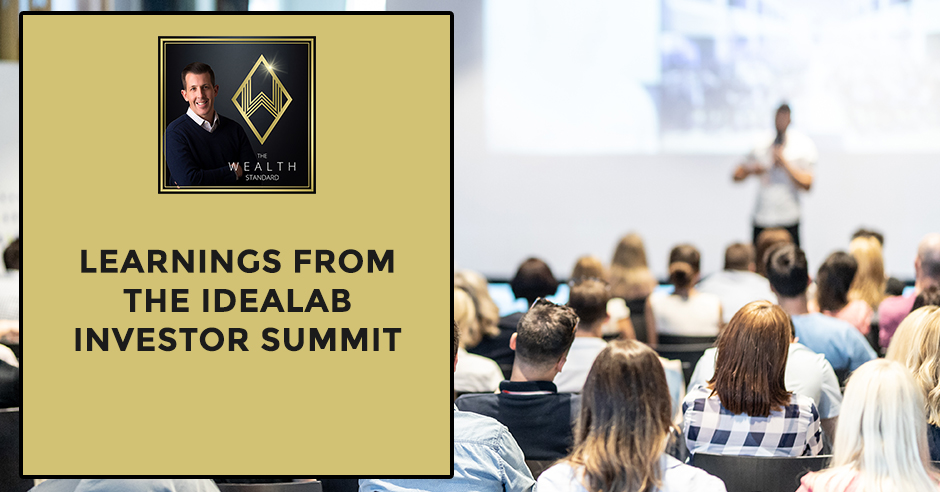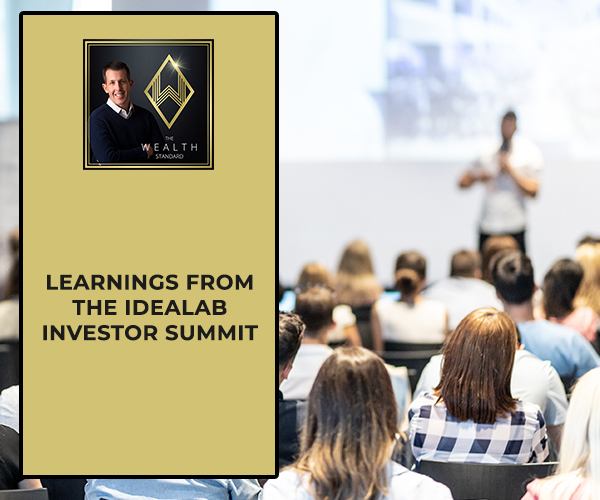Learnings From The IdeaLab Investor Summit
Podcast: Play in new window | Download

The Idealab Investor Summit is a haven for anyone looking to learn great knowledge, meet great people, and bring home great ideas. Today, Patrick Donohoe who has recently been to this conference, takes us through his experience and shares what he has learned at these few days and how he plans to apply it to something that would be valuable. With the theme this season, which is about making successful investments, Patrick shares five things that can help create a fruitful venture. He notes how the impact of quality questions and the application of need-based psychology can help achieve this.
—
Watch the episode here:
Listen to the podcast here:
Learnings From The IdeaLab Investor Summit
It’s going to be an awesome episode because I just got back from an incredible conference. I didn’t come home and I went to another conference. I was in Los Angeles in Pasadena. Now, I’m in Sun Valley, Idaho. I am waiting for the kickoff conference presentation for the finance event put on by Tony Robbins every single year. The last time was in Whistler, which is an amazing time. If you didn’t check out the YouTube series, I did that and highlighted what I took away every single day of that event. Check that out on YouTube. I’m going to do something similar. I’m also going to have some special guests in the room doing some interviews on various investments and things that they specialize in.
The Pasadena and Los Angeles Conference
I’m not here to talk about that right now. I’m going to talk about the Pasadena and Los Angeles conference that I went to and it was part of an investment that I made. A lot of the reason behind why I did it was simply the network, the people that were involved with it. Also, the summit that I went to, and how I was able to learn about the specific companies that were in this fund as well as experience, some things that I wasn’t anticipating. I knew that there was going to be something there. I’m going to talk specifically about that. It was at the Idealab headquarters, which is in Pasadena.
Idealab is an incubator. An incubator is a company that takes early-stage ideas, creates some investment in those ideas and also helps to grow it into a full-fledged business. It was started by Bill Gross. He’s not necessarily the PIMCO guy, but he’s the inventor and the technologist. He has done multi-million dollar exits with various companies over the years. He has a tremendous reputation and spirit about him as far as helping to solve a lot of the world’s problems. I’m not going to talk specifically about the investments that are within this fund or what he’s up to. You can check out Idealab.com and see those. There are links to the specific companies in there.
Five Things For Making Successful Investments
A lot of it is inventions around renewable energy and energy storage that are revolutionary. It’s going to be incredible to see how those come to fruition. What I wanted to do is essentially take what I learned at these few days and apply it to something that would be valuable to you and specifically to the theme of this season, which is an investment and making successful investments. I came up with five things. The first one is interesting. It’s hard to explain, but I’m going to do my best.
It’s that successful business ventures, successful people and successful investment is the result of a quality question. Subsequently, the results of that question, which would be the value proposition of the underlying business or investment. It’s asking those insightful, meaningful questions to ourselves or in general before starting to limit how we accomplish it. That’s where everyone gets stuck. I’m going to give you some examples. A question I came up with and it needs to be simpler than this but I did it as an example, is how can you store and distribute renewable energy that didn’t hurt the environment and was less expensive than what it now costs?
The second one would be, what if there was a way to get good food faster and cheaper? Another one could be, how could I have real-time information that my aging mother is safe? That was one of Bill’s questions with some of the ideas he’s thinking about. Another one specific to you and your situation is, how can I make more money with my investments and have more control and less risk? Another one could be, how can I make more money in a profession I love and work less so that I can do the things I love with the people I love? These are those quality questions. It’s focusing on clarity around those questions before you get into how to solve it. I’m going to give you an example based on one of the exercises we did.
What Happened The Last Day
The last day of this investment summit was that we all came up with an idea and everyone voted on the ideas. We got into nine separate groups and took fifteen minutes to come up with a three-minute pitch of that ideas. I went to the group that the idea was essentially a monitor for children so that if they were in a public place and were lost or heaven forbid kidnapped, there would be a notification to the parents. The quality question that we came up with is, what if you never had to worry about the safety of your child in a public place? Here’s what was amazing is when we got into these groups, we only had fifteen minutes to come up with the pitch.
Almost everyone went to, “How do you do it?” It was, “We could do it this way.” “No, you can’t do it this way because of that,” then it was, “We’ll do it this way.” “No, you can’t do it this way because of that.” We as human beings naturally rush to why it’s not possible instead of gaining crystal clarity around the actual underlying question as well as the results that we want. I know this sounds so simple and it may seem irrelevant or insignificant, but it’s going to lead to my second point, which is the whole idea of proximity is power. It’s not how or what. It’s who. This is what’s important.

IdeaLab Investor Summit: An incubator is a company that takes early-stage ideas, creates investments in those ideas, and helps it grow into a full-fledged business.
For those of you who haven’t seen the Bill Gates documentary series on Netflix called Inside Bill’s Brain, watch it. It’s fascinating. It proves this point. Bill Gates and Bill Gross are part of a few ventures. Bill Gates is part of one of the companies that are inside of Idealab called Heliogen. These guys understand it. They understand the nature of a network and the nature of knowing people in all sorts of specialties and areas. I’ll give you an example. In this docuseries by Bill Gates, he presents these quality questions.
One of the questions revolves around energy, how can we have abundant energy for the world? They came up with this strategy. They get to this idea of how to turn nuclear waste. The waste that came from nuclear facilities in the past, how could you turn that into safe, clean nuclear energy that does not have any probability of a meltdown and is clean. He went out and he networked with those that had expertise and specialty in this area. It’s not 1 or 2 persons but multiple people. He brought them together and that’s how they came up with the solution.
If he went to one, he’s probably not going to do it. If he went to two, he’s probably not going to do it. He brought a team together to figure out that solution. This is why I think it is important when it comes to investments. Number one, it’s creating a quality question around what you want, what the results are that you are after. What if I could do this? What if I could do that? What if my life looked like this? Then you start to look for that inside of your network that could help facilitate this as opposed to you figuring it out.
If you knew how to do it, you would already be doing it. That’s where people get stuck because they feel that they have to do everything in a single dimension. Whereas the idea of creating brainpower comes from multiple people in their area of expertise in order for you to figure out how to do it. It’s not you figure it out, but it’s the team environment, the network that’s enabling you to do that. I’ll give you another example. I was talking to an individual that was part of this group. He is really successful. He’s done nine-figure venture capital funds doing some incredible things. I won’t get into it because I don’t have his permission to talk about it.
He said the exact same thing. He was able to make so many different connections with his network in Northern California and was able to exit a few businesses of his own. He started to put together deals doing some incredible things. It’s him being able to have these relationships in various areas, bringing those relationships together and solving these incredible problems. He alluded to the same thing. It wasn’t the Bill Gates docuseries. It wasn’t what Bill Gross did, bringing amazing people together because of all of the teams that were associated with the Idealab companies and ventures, these professional teams that he had preexisting relationships with.
Proximity is power. Click To TweetLeverage And Delegation
This brings me to my third point. We’ve discussed this in a previous episode this season, which is the difference between leverage and delegation. I believe that the easy thing to do is to delegate. It’s to put the responsibility for everything on the shoulders of somebody else. Leverage is within our control. Being able to be crystal clear about any outcome, an investment outcome, the results of an investment as well as understanding the expectations that you have and the clarity around those results. What you are expecting as well as the accountability structure that exists, knowing how to along the way with certain milestones that things are successful. We hit this with this and noticing signs that things are not going well.
There may seem to be these subtle differences between leverage and delegation. The leverage is what I explained before. It’s Bill Gates and his knowledge to a certain point, of what the outcome is, of what the problem is and having enough information about how things work to be able to bring a team together and be clear about the mutual expectations. That’s the third, leverage versus delegation. The fourth one is also interesting. It does relate to what I’ve been talking about, which is the criteria for a winning company/investment.
As I said before, the quality of the underlying business structure is typically the quality of the investment. One of the things they went through is how they go about identifying an idea and the success of an idea. The first thing they look for is an experienced leader, an experienced CEO, not one that is appointed or because of tenure gets that role or the founder. It’s an experienced executive, someone that’s been there and done that. It’s an experienced professional investment team. This isn’t their first rodeo. They’ve been through multiple different ventures and companies before.

IdeaLab Investor Summit: Successful business ventures, successful people, and successful investments are the result of quality questions.
Even though they may not have expertise in the specific fields, they can orchestrate the business fundamentals, the investment fundamentals. It’s identifying the market that exists where whatever the underlying business or investment is, has value. It solves a big problem. The potential audience is identified. If it’s a small audience, it may not be worthwhile. If it’s a massive audience, if this business or investment unless you make a difference with lots of people’s lives, that’s something to take into consideration. The timing is also important. These days, especially as things are going so quickly, knowing whether the market is right for this specific idea.
The next is that there are opportunities to iterate, meaning you have a product or a service or an investment that comes to the market. There’s constant improvement, constant iteration, being able to improve this, improve that and make it even more valuable. The next one is Moore’s Law, which I found is interesting that the underlying business and investment are able to be grown or scaled based on computing power, leveraging technology. The next is persistence coming from the team itself, the founder, the question that they have, the quality question, the mission that they’re on, the results that they’re after, which is doing something great. The persistence comes from that.
Going the extra mile comes from knowing that they’re doing something amazing and great. Finally, there’s a differentiating factor. There’s something different. It’s not the next Starbucks, Pizza Hut or Papa John’s. There’s a differentiating factor. It provides that marginal difference to make it great versus average or normal. That’s number four is the quality of the company, investment, the team and identifying where it fits. The final is to know the needs of the team, specifically the executives, the founders and knowing what they are driven by.
Tony Robbins talks about needs-based psychology, which is the six human needs: certainty, uncertainty, significance, love, connection, growth and contribution. We all have these needs. What those needs are is we do things in life. We act a certain way in order to meet these specific needs. We all would assume to know a person that is driven by significance, how they’re going to make decisions, show up, behave. It’s all about them because you have some driving needs that dictate a person’s behavior, the decisions that they make.
If the significance is at the top, that’s one of those underlying needs that may destroy an investment. It may not enable the successful teamwork that is necessary for an investment or an idea, a company to be successful. It’s understanding those needs. If those needs are based around contribution making a difference, that’s something we need to identify because that could lead to that persistence, the necessity of iterating, trial and error, failure and trying again. All of these five points is to allow for more information so when you are making a decision about a business or about an investment that you ask different questions and analyze different things. You look for different things that could either make you more excited or things to do some more due diligence on to formulate better questions to ask or to determine whether it is a fit or not a fit because it could be exciting on the surface.
Nobody comes to an investor and talks about all the different things that could go wrong. They’re always talking about what could go right. It becomes your stewardship to ask better questions to determine what is right and is the truth. There are always going to be downsides, but rarely they’re talked about. It’s a good sign when you do have someone that is pitching an investment that talks about the downsides, what could go wrong? It comes to, it’s not about no cons, no downsides. It’s about the pros. The upsides are worth whatever those downsides are. They’re greater than what those downsides are.
Going the extra mile comes from knowing that you're doing something amazing and great. Click To TweetHopefully, this is has helped. This is a great experience for me. I’m trying to figure out how to best translate my experience into something that would be valuable to you. Looking at this season, the importance of due diligence, the importance of asking good questions is vital. This team has been around for a long time. You can look at Bill Gross’ history. He’s gone through so many different failures, so many different successes over and over again. He’s identified ways to be even more successful and it comes from those lessons. Leveraging his experience is what I did. I put those points in five different categories.
If you want to review those, go to TheWealthStandard.com website. Make sure you subscribe as well. I’m glad that you are supporting us. Hopefully, this has made a difference for you. For those of you who’ve been tuning in a long time, I’d love to hear your feedback. Go ahead and email me at Hello@TheWealthStandard.com. I hope you enjoyed this episode. We’ll be back with the next episode that revolves around my experience at the Tony Robbins Finance Event up here in Sun Valley, Idaho. Thanks again. We’ll talk to you soon.
Important Links:
- YouTube – Previous episode
- Idealab.com
- Inside Bill’s Brain – Netflix documentary
- Heliogen
- Previous episode – Business Mastery with Patrick Donohoe
- Hello@TheWealthStandard.com
Love the show? Subscribe, rate, review, and share!
















